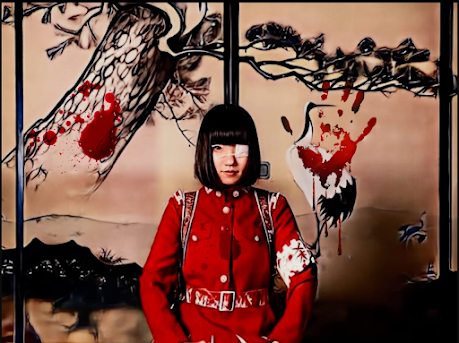Unveiling the Dark Mysteries of Japanese Creepypasta
Japanese creepypasta is a subgenre of internet horror stories that have gained notoriety for their chilling and often unsettling narratives. These tales, deeply rooted in Japanese folklore, urban legends, and contemporary internet culture, have captivated and terrified readers worldwide. In this blog, we will delve into the world of infamous Japanese creepypasta, exploring some of the most spine-tingling and enduring stories that continue to haunt the online community.
Kuchisake-onna: The Slit-Mouthed Woman
One of the most well-known Japanese creepypasta legends is that of Kuchisake-onna, the Slit-Mouthed Woman. This terrifying entity is said to be a disfigured woman who roams the streets of Japan, wearing a surgical mask to hide her grotesque appearance. She is known to approach unsuspecting victims, asking them if they think she is beautiful. If they respond negatively or with fear, she unveils her gruesome secret: a mouth slit from ear to ear. Kuchisake-onna then proceeds to chase her victims with a pair of scissors, determined to make their appearance match her own.
This urban legend has spawned numerous variations and adaptations in literature, film, and pop culture. The story taps into societal anxieties about beauty and deformity, making it a truly unsettling tale.
Teke Teke: The Ghostly Half-Woman
Teke Teke is another spine-chilling Japanese creepypasta that has captured the imaginations of horror enthusiasts. According to the legend, Teke Teke is the vengeful spirit of a woman who was tragically sliced in half by a train. Now, she roams the streets at night, dragging her upper body along the ground, making a distinctive "teke teke" sound. If she catches you, she will slice you in half as well.
This story plays on primal fears of disfigurement and the supernatural, making it a particularly unsettling tale that has become a staple in Japanese horror folklore.
Hitori Kakurenbo: The One-Man Hide and Seek
Hitori Kakurenbo, or "One-Man Hide and Seek," is not just a story but a chilling real-world paranormal game that originated in Japan. In this game, participants summon a spirit to possess a doll by performing a specific ritual. Once the spirit is believed to have entered the doll, the player hides while the spirit seeks them out, often with malevolent intentions.
This creepypasta has garnered attention because some individuals have claimed to experience unexplained and terrifying events while playing Hitori Kakurenbo. While skeptics argue that it's all in the mind, the eerie accounts have contributed to the legend's enduring popularity.
Gekkou no Kamen: The Moonlight Mask
Gekkou no Kamen, or "Moonlight Mask," is a relatively obscure but deeply unsettling Japanese creepypasta. It tells the story of a mysterious anime series called "Moonlight Mask" that aired in the 1970s. Viewers who watched the series began experiencing bizarre and horrifying occurrences in their lives, often leading to madness or death. The legend suggests that the anime contained hidden subliminal messages or supernatural elements that cursed its viewers.
While there's no concrete evidence to support the existence of the cursed anime, Gekkou no Kamen stands as a testament to the power of storytelling and its ability to generate fear and fascination.
Conclusion
Japanese creepypasta offers a chilling journey into the dark realms of folklore, urban legends, and the human imagination. These stories tap into primal fears, explore societal anxieties, and blend the boundaries between the supernatural and reality. While the legends mentioned in this blog are just a glimpse into the vast world of Japanese creepypasta, they serve as a reminder that sometimes the most terrifying tales are the ones that linger in the shadows of our collective consciousness, waiting to unsettle our dreams and fuel our nightmares.




Comments
Post a Comment